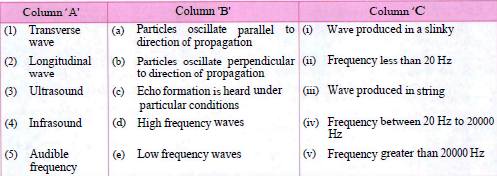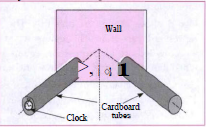Complete Solutions to EXAMPLE of chapter Study of Sound of Class 9 book with complete answers and questions
| Class 9 | PHYSICS |
| Chapter | Study of Sound |
| CHETANA PUBLICATION | EXAMPLE |
| Number Of Questions | 80 |
| Academic Year | 2023-24 |
How does the velocity of sound depend on its frequency?
02:27View SolutionHow is the direction of the oscillation of the particles of the medium related to the direction of propagation of the sound wave?
03:51View SolutionFind the odd one out:
Bats, rats, cats, dolphins02:11View SolutionFind the odd one out:
Clothes, paper, curtains, mirror01:53View SolutionFind the odd one out:
Submarines, icebergs, internal organ, sunken ships.02:52View SolutionFind the odd one out:
Temperature,density, molecular weight, pressure02:48View SolutionHow can one produce sound?
03:33View SolutionWhat is velocity of sound wave ?
04:58View SolutionWhat is theminimumdistance of the reflecting surface to hear an echo ?
02:06View SolutionMatch the columns:
 06:39View Solution
06:39View SolutionMatch the columns:
 00:55View Solution
00:55View SolutionA form of energy which produces sensation of hearing in our ears.
00:51View SolutionRepetitions of sound due to reflection .
00:46View SolutionThe audible range of sound for human being.
00:34View SolutionA method to obtain images of internal organs of the human body.
01:00View SolutionThe matter or substance through which sound gets transmitted.
00:43View SolutionThree major parts of the ear.
01:02View SolutionAny two examples in which infrasound is produced.
00:52View SolutionName the living beings that can produce ultrasound.
01:12View SolutionThe roof of a movie theatre and a conference hall is curved.
05:43View SolutionThe intensity of reverberation is higher in a closed and empty house.
05:54View SolutionWe cannot hear the echo produced in a classroom.
01:37View SolutionBats can navigate in dark.
04:26View SolutionA SONAR system is installed in a ship.
05:15View SolutionSound travels faster in iron than in air.
04:16View SolutionNita heard the sound of lightning after 4 seconds of seeing it. What was the distance of the lightning from her?
(The velocity of sound in air is `340 m//s`)04:10View SolutionUltrasonic waves are transmitted downwards into the sea with the help of a SONAR. The reflected sound is received after 4 s. What is the depth of the sea at that place?
(Velocity of sound in seawater =`1550 m//s`)05:16View SolutionA person standing near a hill fires a gun and hears the echo after 1 second. If speed of sound in air is `340 m//s`. Find the distance between the hill and the person.
01:56View SolutionSunil is standing between two walls. The wall closest to him is at a distance of 660 m. If he shouts, he hear the first echo after 4 s and another after another 2 seconds.
What is the velocity of sound in air?02:01View SolutionSunil is standing between two walls. The wall closest to him is at a distance of 660 m. If he shouts, he hear the first echo after 4 s and another after another 2 seconds.
What is the distance between the two walls?04:39View SolutionIf you hear the thunder 20 seconds after you see the flash of lightning, how far from you hasthe lightning occurred? (Speed of sound in air = `340 m/s`)
02:32View SolutionAboy observes smoke from a cannon 3seconds before he hears the bang. If the cannon is 1020 m from the observer, find the velocity of sound.
02:47View Solutionafires a gun. He heard the echo of the sounds from the first building after 2 seconds and echo i from the second building after 3 seconds. Find the distance between two buildings. (Speed of sound in air = `340 m/s`)
03:42View SolutionSound waves of wavelength1cm have a velocity of 340 m/s in air. What is their frequency? Can this sound be heard by the human ear?
02:42View SolutionHow long will it take for a sound wave of 25 cm wavelength and 1.5 kHz frequency, to travel a distance of 1.5 km?
03:15View SolutionCalculate distance travelled by a sound wave having frequency 1000 Hz and wavelength 0.25 m, if it travels for 5 seconds in a certain medium.
01:56View SolutionThe audible range of sound is 20 Hz to 20000 Hz. At `22^@C` in airspeed of sound is `344 m//s`.Express the range of sound in terms of wavelength by calculating the respective values.
03:24View SolutionA sound wave has frequency 320 Hz and wavelength 0.25 m. How much distance will it travel in 10 second?
02:36View SolutionThe molecular weight of oxygen gas (02) is 32 while that of hydrogen gas (H2) is 2. Prove that under the same physical conditions, the velocity of sound in hydrogen is four times that in oxygen.
04:30View SolutionHydrogen gas is filled in two identical bottles, A and B, at the same temperature. The mass of hydrogen in the two bottles is 12 gm and 48 gm respectively. In which bottle will sound travel faster? How mant times as fast as the other?
05:11View SolutionHelium gas is filled in two identical bottles A and B. The mass of the gas in the two bottles is 10 gm and 40 gm respectively. If the speed of sound is the same in both bottles, what conclusions will you draw?
04:16View SolutionHydrogen gas is filled in two identical bottles, A and B, at the same temperature. The mass of hydrogen in the two bottles is 10 gm and 90gm respectively. In which bottle will sound travel faster? How many times as fast as the other?
04:02View SolutionArgon gas is filled in two identical bottles X and Y. The mass of the gas in the two bottles is 5 gm and 25gm respectively. If the speed of sound is the same in both bottles, what conclusions will you draw?
03:25View SolutionThe speed of sound in air at `0^@C` is `332 m//s`. If it increases at the rate of `0.m//s` per degree, what will be the temperature when the velocity has increased to `344m//s`?
05:23View SolutionVelocity of sound in air at 0°C is 332m/s. It increases by `0.6m//s` for each °Celsius rise in temperature. At what temperature of air, the velocity will be `359m//s`?
04:31View SolutionVelocity of sound in air at `0^@C` is `332m//`s. It increases by `0.6m//s` for each degree Celsius rise in temperature. What will be the velocity of sound at `60^@C`?
03:12View SolutionDefine the following:
Wavelengthf `lambda` )01:35View SolutionDefine the following:
Amplitude (A)01:54View SolutionDefine the following:
Frequency (`nu`)02:01View SolutionDefine the following:
Time Period (T)01:57View SolutionDefine the following:
Echo02:07View SolutionDefine the following:
Transverse waves03:08View SolutionDefine the following:
Longitudinal waves03:00View SolutionDefine the following:
Velocity of wave02:00View SolutionDistinguish between:
Infrasound and Ultrasound03:34View SolutionDistinguish between:
Transverse waves and Longitudinal waves05:39View SolutionHow will you reduce reverberation in public halls or buildings?
02:46View SolutionHow is ultrasound used in medical science?
04:22View SolutionAnswer the following questions:
Study the construction of the Golghumat at Vijapur and discuss the reasons for the multiple echoes produced there.02:11View SolutionWhat should be the dimensions and the shape of classrooms so that no echo can be produced there?
02:40View SolutionConsider two cases
(A) whistle of train (B) roar of a lion
In which case the sound is high pitch?01:40View SolutionConsider two cases
(A) whistle of train (B) roar of a lion
What is the real cause of sound production? Explain with examples.04:23View SolutionConsider two cases
(A) whistle of train (B) roar of a lion
Three sounds 5 Hz, 500 Hz and 50,00 Hz are procued by different sources.
Which sound will be heard by humans?03:31View SolutionConsider two cases
(A) whistle of train (B) roar of a lion
Three sounds 5 Hz, 500 Hz and 50,00 Hz are procued by different sources.
Which sounds may be produced by bats?02:28View SolutionConsider two cases
(A) whistle of train (B) roar of a lion
Three sounds 5 Hz, 500 Hz and 50,00 Hz are procued by different sources.
Which sounds may be produced by elephants?02:10View SolutionSuppose you and your friend are on the moon. Will you be able to hear any sound
02:48View SolutionTo hear the echo distinctly,will the distance from the source of sound to the reflecting surface be same at all temperatures? Explain your answer.
07:02View SolutionWhen is the reflection of sound harmful?
04:42View SolutionWhat kind of waves are created when a stone is dropped in water ?
05:27View SolutionHow are the frequencies of notes sa, re, ga, ma, pa, dha, ni related to each other?
04:34View SolutionWhat is the main difference between the frequencies of the voice of a man and that of a woman?
02:42View SolutionIn the above activity, what will happen if you lift one of the tubes to some height?
 03:16View Solution
03:16View SolutionMeasure the angle of incidence `theta_1` and the angle of reflection `theta_2`. Try to see if they are related in any way.
03:04View SolutionWhat is an echo? What factors are important to get a distinct echo?
10:17View SolutionWhere and why are sound absorbing materials used?
04:39View SolutionWhat are the factors on which velocity of sound in gaseous medium depend?
03:40View Solutionwhat are the uses of ultrasonic sound?
05:00View SolutionExplain with the help of a neat lablled diagram the working of human ear.
05:08View SolutionWrite in short note on SONAR?
03:58View SolutionWrite short note on Sonogaphy. How is it misused.
06:02View Solution
EXAMPLE questions and complete solutions for chapter Study of Sound of CHETANA PUBLICATION of Class 9
